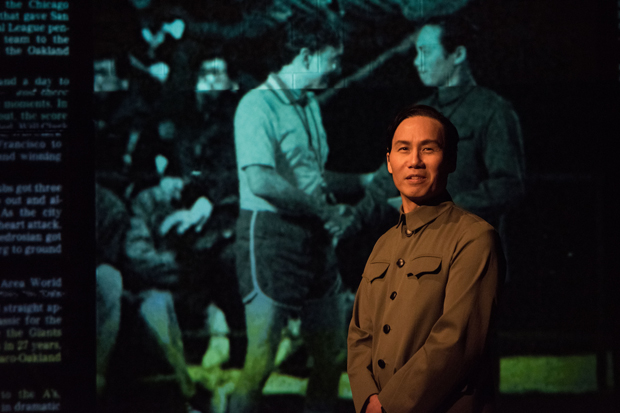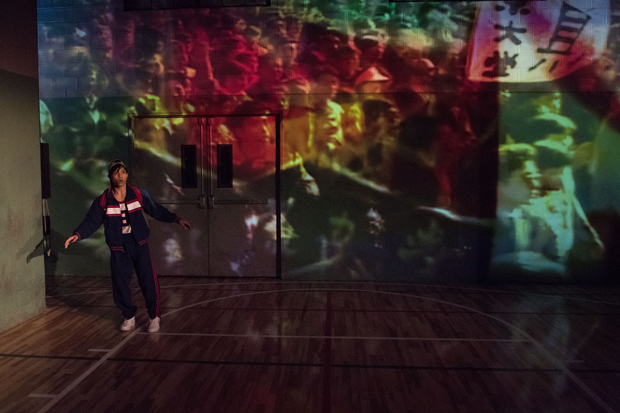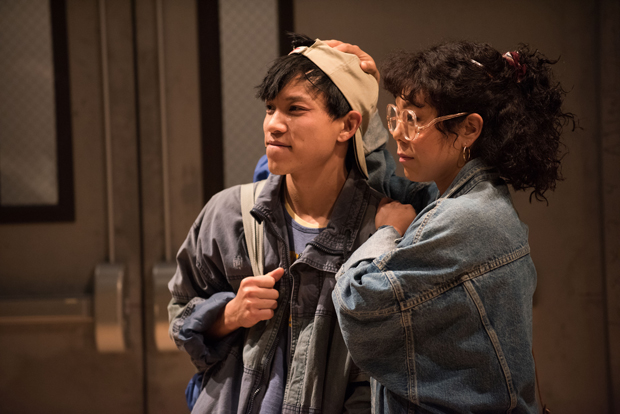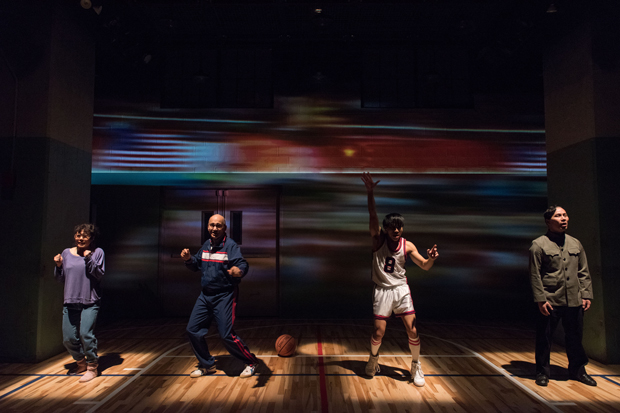Shooting for Political and Personal Victories in The Great Leap
Atlantic Theater Company presents the New York premiere of Lauren Yee’s new play about basketball and cultural clashes.

(© Ahron R. Foster)
The catalyst for the events in The Great Leap is an imagined cultural exchange that occurred in Beijing, China, in 1971 between an American basketball coach and the Chinese citizen who would use the knowledge taught to him by the American to become a basketball coach himself. Lauren Yee's new play is also engaged in an exchange of its own, sneaking in some potent historical and sociopolitical commentary on East-West cultural and generational divides through time. The globe-spanning narrative follows one San Francisco Asian-American youth's desire in 1989 to score the kind of international success in the basketball world that stars like Yao Ming and Jeremy Lin have achieved only in recent years.
Certainly, 17-year-old Manford (Tony Aidan Vo) has the braggadocio of a pro athlete. Introduced boasting to University of San Francisco basketball coach Saul (Ned Eisenberg) about his skills and legendary reputation on the sidewalk courts of Chinatown, Manford, who is still only in high school, wants to join Saul's team in its upcoming trip to Beijing to play in a friendship game against the Beijing University basketball team. Though initially resistant to his appeals, Saul is eventually won over by Manford's loudmouthed confidence, as well as a bit of insider info Manford offers that he has gleaned from his cousin, Connie (Ali Ahn): that the members of the Chinese team aren't as diminutive in height as Saul assumes.

(© Ahron R. Foster)
The friendship game takes place amid the Tiananmen Square pro-democracy protests in June 1989, which infamously culminated in a Chinese government-sanctioned massacre of protesters. This suggests a political angle to The Great Leap that is seen most explicitly through the character of Wen Chang (B.D. Wong), the aforementioned Chinese basketball coach. A humble citizen who has been raised to be loyal to the whims of the Communist party, Wen Chang offers a quiet contrast to the proudly all-American Saul and the brashly Americanized Manford.
While both Saul and Manford prefer to turn a blind eye to the political turmoil surrounding them in Beijing — with Manford getting accidentally involved in the Tiananmen Square protests after he gets lost and is caught on camera among the protesters chanting "USA! USA!" — Wen Chang has struggled internally with his relationship to Communism for years, desiring to break free from its constraints once he glimpsed an alternative way of life through his interactions with Saul back in '71. That conflict also connects him to Manford and an unseen fifth character — Zhang Li, Manford's late mother and a former basketball player herself — in ways we eventually discover in the play's revelation-filled second half.

(© Ahron R. Foster)
In some ways, Wen Chang is the real heart and soul of The Great Leap, and B.D. Wong poignantly suggests the character's interior travails with a bare minimum of physical gestures; he fully embodies Manford's impression of him as "someone who's been standing still his whole life." Yee's play could have used a bit more of that subtlety. The Great Leap occasionally skirts didacticism in the cross-cultural clashes it explores, especially with the other characters written and played more like archetypes than flesh-and-blood people. Eisenberg hits notes of weary regret to add some depth to Saul's rah-rah Americanism, but Vo overplays Manford's youthful bravado, while Ahn brings emotional warmth to her underwritten role. And the way Yee connects Wen Chang to an iconic moment during the Tiananmen Square protests feels like a contrived last-minute attempt at mythmaking.
Still, when it comes to directly tackling the thematic meat of her play, Yee's writing can be sharp and illuminating. A '71-set flashback sequence in which Wen Chang, then a translator for the Beijing University basketball team, is forced to find tamer equivalents for Saul's vulgar idioms offers a cleverly amusing take on attempts to break down cultural and language barriers. And there's much to admire in director Taibi Magar's economical yet handsome production. Even more impressive than Tilly Grimes's expressive costumes and David Bengali's imaginative use of archival footage in his projections is Broken Chord's sonic contributions: in particular, inventive sound design that occasionally suggests the ghost of Zhang Li haunting these characters, especially during the gripping basketball-game climax, which wrings a maximum amount of suspense out of relatively simple blocking and staging.
For those who come into this play not so well-versed in the cultural and political context it broaches, The Great Leap will play as an entertaining history lesson, at the very least. But the character of Wen Chang offers something more: an affecting portrait of a man who finally realizes the emotional limits of his cultural and political loyalties.

(© Ahron R. Foster)









